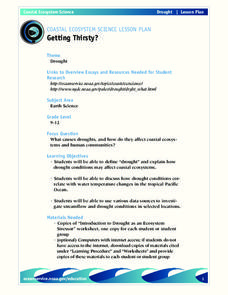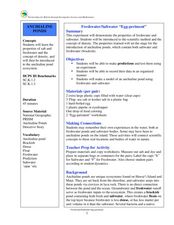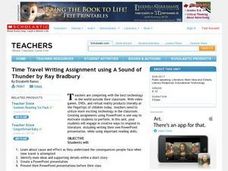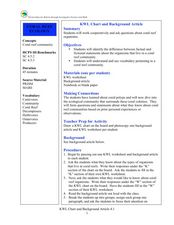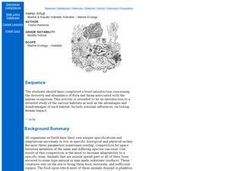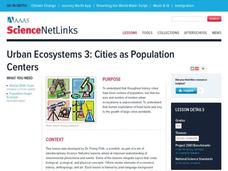Curated OER
Imagine a Kelp Forest
Students write a story based on their research of the kelp forest. In this ecosystem activity, students view a video and research the kelp forest ecosystem. They write a short story imagining the discovery of a new species in the kelp...
Curated OER
Getting Thirsty?
Students explore the concept of drought and its significance as a natural hazard. For this drought lesson plan, students complete 13 questions on an "Introduction to Drought as an Ecosystem Stressor" worksheet and discuss the responses...
Curated OER
Ecology - Food Chains
Students discuss the concept of a food chain in the California ecosystem. in this food chain lesson, students look at different cards and sort them into herbivores, carnivores, decomposers, and omnivores. Then they use these cards to...
Curated OER
Oh, What a Tangled Web We Weave
Fifth graders investigate the food chain by viewing video clips. In this food web instructional activity, 5th graders investigate populations and ecosystems by viewing a video in class as well as visiting web sites. Students utilize the...
Curated OER
Freshwater/Saltwater "Eggs-Periment"
Learners explore water properties by conducting a class experiment. In this buoyancy instructional activity, students utilize freshwater, saltwater, plastic cups, hard boiled eggs and food coloring to experiment with the floating...
Curated OER
Does Clear Water mean Healthy Water?
Learners test their local aquatic site to determine its water clarity. They collect a water sample and measure its turbidity using a sensor, then they repeat the experiment to obtain a second turbidity reading to find the average value.
Curated OER
Time Travel Writing Assignment using "A Sound of Thunder" by Ray Bradbury
Students examine the consequences of time travel through the analysis of the short story "A Sound of Thunder" by Ray Bradbury. They watch a PowerPoint presentation, conduct Internet research on endangered ecosystems, and create a...
Curated OER
KWL Chart and Background Article
Students discuss an ecosystem. In this coral reef lesson, students fill in their own KWL chart and contribute ideas to a whole class KWL chart. They read an article as a class to spark ideas for facts they can add to the "K" part of the...
Curated OER
Beach Cleanup at a Local Beach
Students participate in an environmental clean-up activity. In this environmental lesson, students travel to a local beach. Working in small teams, students collect trash from the local beach. Returning to school, students sort the trash...
Curated OER
Birds: Wetlands Ecosystems
In this birds worksheet, students click on the links to learn about the birds of the Wetlands and answer short answer questions about it. Students complete 7 questions total.
Curated OER
Marine & Aquatic Habitats Activities - Marine Ecology
Students enact the life cycle of a sessile animal and quantify the possibility of survival under the conditions given. They then present to the class a new adaptation which will increase the animals chance of survival.
Curated OER
Curriculum Activities: Ecological Concepts
Students explore a variety of microclimates to develop an awareness of why organisms live where they do. Moisture, time of day, land cover, and temperature form the basic concepts of this investigation.
Curated OER
Bee Pollen Popular
The world would be a much different place without the help of pollinators. Read about the important role bats, hummingbirds, and various insects play in plant reproduction, exploring the interdependence of living things in an ecosystem....
Curated OER
Solid Waste Recycling
Students seek scientific and technological solutions to envrionmental problems. They record class activities in a journal. They identify relationships among living things and their environments.
Curated OER
Water Pollution
Fifth graders study the impact of human activity on water quality and on the ecosystems of Earth. After a discussion on the various ways that water can be polluted, groups of youngsters get together to figure out the best way to clean a...
Curated OER
The Search for El Nino
Sixth graders complete an El Nino scavenger hunt. In this earth science instructional activity, 6th graders describe the conditions that create El Nino and compare it to normal condition. They discuss how this phenomenon affects marine...
PricewaterhouseCoopers
Waste and Recycling: Recycling Paper
We take paper for granted, while thousands of trees are being made into the paper we toss in the trash. Start a dialogue about paper reduction and recycling in class, and share the negative effects paper production has on our...
Curated OER
Making a Food Web and Learning About Ecosystems
Third graders examine the difference between a food web and food chain. They also examine the importance of the sun in a food web and food chain. Students understand what happens when you remove parts of the chain.
Curated OER
Urban Ecosystems 3: Cities as Population Centers
Students discover that throughout history cities have been centers of population but that human exploitation of fossil fuels was key to the growth of large cities worldwide. They research urban growth through a number of websites.
NOAA
Methane Hydrates – What's the Big Deal?
Have you ever tried to light ice on fire? With methane hydrate, you can do exactly that. The ice forms with methane inside so it looks like ice, but is able to burn. The lesson plan uses group research and a hands-on activity to help...
NOAA
Biological Oceanographic Investigations – What's in That Cake?
Have you ever tried to find hidden items in a picture when you don't know what you are looking for or how many things are hidden? A lesson applies that same concept to sampling the deep sea habitats. Participants must first create a...
NOAA
Biological Oceanographic Investigations – Call to Arms
How many simple machines does it take to make a robotic arm? An inquiry-based instructional activity explores that topic and challenges pupils to build a robotic arm that can stretch, turn, and more. A few questions help guide...
Curated OER
Ecosystems
Students role play as members of interest group with a stake in a local land use issue. In preparation for the town hall meeting, students research their issue and gather pertinent information to persuade their audience.
Curated OER
Biodiversity and Ecosystems
Middle schoolers differentiate between biotic and abiotic factors in this science lesson. Learners collect data for the experiment and analyze the data after graphing it using the CBL 2. This experiment is split into two different...

